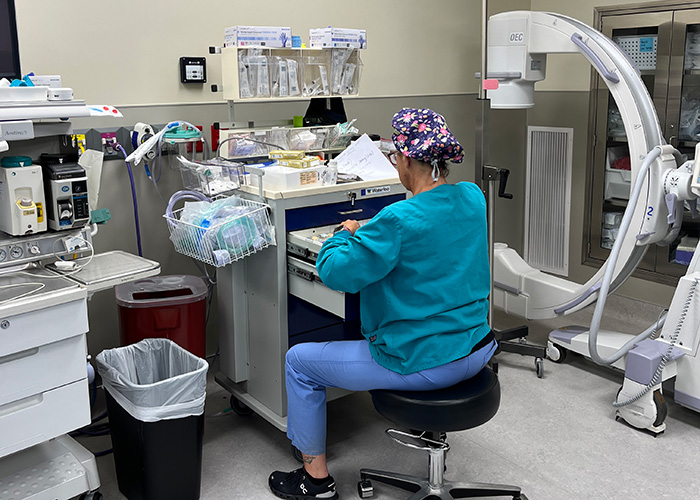Orthopedic Care
Evolving the Orthopedic treatment process: Orthopedic care has come a long way, transforming from a conventional model of treating musculoskeletal conditions to a more comprehensive and patient-centric approach. The evolution of the orthopedic treatment cycle reflects a commitment to providing individuals with the best possible care, considering not only the immediate relief of symptoms but also long-term well-being and quality of life


Orthopedic Treatments & Procedures.
- Foot & Ankle
- Fractures/Trauma Care
- General Repairs
- Neck & Shoulder
- Spine Surgery
- Hip & Knee
- Total Joints
- Hand & Wrist
- Post-Surgical Pain
- Auto & Work Injuries
Spinal Fusion
Spinal fusion is a surgical procedure that involves joining two or more vertebrae in the spine to eliminate the movement between them.
Arthroscopy
Arthroscopy is a minimally invasive surgical procedure used to diagnose and treat various joint conditions. This arthroscope contains a light source and a camera that allows the surgeon to visualize the interior of the joint on a monitor.
Rotator Cuff Repairs
Involves a surgical procedure performed to repair a torn or damaged rotator cuff in the shoulder. The rotator cuff is a group of muscles and tendons that surround the shoulder joint, providing stability and facilitating arm movement
Discectomy
A discectomy is a surgical procedure performed to remove part or all of a damaged or herniated disc in the spine. When a disc becomes damaged or herniates, it can put pressure on nearby nerves, leading to pain, numbness, and weakness.
Laminectomy
A laminectomy, also known as decompressive laminectomy, is a surgical procedure that involves the removal of a portion of the lamina, which is the bony arch on the vertebrae that forms the roof of the spinal canal
Anterior Discectomy & Fusion
Involves a surgical procedure performed to treat certain cervical spine conditions, including degenerative disc disease, herniated discs, and cervical radiculopathy (compression of nerve roots in the neck)
SCS Permanent Placement
Only after a successful SCS Trial, a permanent device will then be implanted into the spine. This device consists of small wires (which are inserted between the vertebrae and the spinal cord) and a small battery pack (similar to a pacemaker’s, which is located just under the skin.) The device allows patients to send low electrical impulses by using a remote control (located outside of the body) whenever pain is felt.
Spinal Cord Stimulator (SCS) Trial
A temporary device is inserted into the spine within the epidural space using a hollow needle. The device will send a small amount of electricity directly to the spine to help relieve severe pain. After evaluation, the trial is considered successful if overall pain has reduced by 50% or more.
General Surgical Procedures
General surgical procedures encompass a broad range of surgical interventions that are not limited to a specific region or system of the body. General and orthopedic surgeons are trained to perform a variety of surgeries, and their expertise covers procedures across different musculoskeletal systems
FAQ
Frequently Asked Questions
When would be a good time to see our pain management specialists?
It’s a good time to seek a pain management specialist when pain does not respond to usual treatments within a reasonable amount of time. Often people see pain management as a last resort for pain, instead of a first stop on the road to total body care.
There are several complexities to pain management, recognized as a separate medical subscpecialty by the American Board of Medical Specialties. Physicians choosing to specialize in pain medicine must now complete a one-year multidisciplinary pain fellowship in addition to successful completion of four years of medical school and four years of anesthesiology residency or appropriate residency training in physical medicine and rehabilitation, neurology or psychiatry.
What type of insurance do we accept?
Fortitude Healthcare is an out of network provider. We also accept Medicare.
Are new patients accepted?
Yes! Absolutely, give us a call.
What should I expect at my first visit with Fortitude Healthcare?
On your initial visit, you will be evaluated by a pain management specialist. You will be asked about your medical history, and a thorough exam will be conducted to evaluate your areas of pain, to determine your customized treatment plan. Please bring all MRI, X-Ray results (written reports, NOT films) to your visit. Also, make sure you bring your insurance card and driver’s license or identification card.
How do I know if I have chronic pain?
Chronic pain is defined as pain that has lingered for more than three months despite treatment or medication.
What are the most common problems that lead to chronic pain?
- Back pain
- Failed Back Surgery Syndrome
- Headaches
- Fibromyalgia
- Joint Pain
- Muscle Pain (Myalgia)
- Neck pain
- Nerve Pain
- Osteoarthritis
- Sports Injuries
- Work-related Injuries
Will I be prescribed medication at Fortitude Healthcare?
The decision to prescribe medication is at the discretion of the Fortitude Healthcare Provider.
What is pain management?
Pain can be debilitating and frustrating. It may interfere with sleep, work, activities, and quality time with friends and family. Pain management provides relief through various treatments.
What if I need to cancel my appointment?
We understand that things come up.Should you need to cancel or reschedule your appointment, please provide us with a 24 hour notice. Failure to do so will result in a $20 cancellation fee.
***Effective 11/01/2021. Cancellation fee subject to change***
